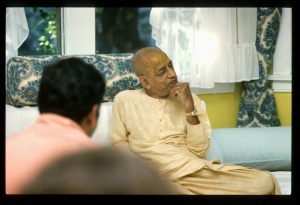SB 2.2.33

A.C. Bhaktivedanta Swami Prabhupada
TEXT 33
- na hy ato 'nyaḥ śivaḥ panthā
- viśataḥ saṁsṛtāv iha
- vāsudeve bhagavati
- bhakti-yogo yato bhavet
SYNONYMS
na — never; hi — certainly; ataḥ — beyond this; anyaḥ — any other; śivaḥ — auspicious; panthāḥ — means; viśataḥ — wandering; saṁsṛtau — in the material world; iha — in this life; vāsudeve — unto Lord Vāsudeva, Kṛṣṇa; bhagavati — the Personality of Godhead; bhakti-yogaḥ — direct devotional service; yataḥ — wherein; bhavet — may result in.
TRANSLATION
For those who are wandering in the material universe, there is no more auspicious means of deliverance than what is aimed at in the direct devotional service of Lord Kṛṣṇa.
PURPORT
As will be clarified in the next verse, devotional service, or direct bhakti-yoga, is the only absolute and auspicious means of deliverance from the grip of material existence. There are many indirect methods for deliverance from the clutches of material existence, but none of them is as easy and auspicious as bhakti-yoga. The means of jñāna and yoga and other allied disciplines are not independent in delivering a performer. Such activities help one to reach the stage of bhakti-yoga after many, many years. In the Bhagavad-gītā (BG 12.5) it is said that those who are attached to the impersonal feature of the Absolute are liable to many troubles in the pursuit of their desired goal, and the empiricist philosophers, searching after the Absolute Truth, realize the importance of Vāsudeva realization as all in all after many, many births (BG 7.19). As far as yoga systems are concerned, it is also said in the Bhagavad-gītā (BG 6.47) that amongst the mystics who pursue the Absolute Truth, the one who is always engaged in the service of the Lord is the greatest of all. And the last instruction in the Bhagavad-gītā (BG 18.66) advises fully surrendering unto the Lord, leaving aside all other engagements or different processes for self-realization and liberation from material bondage. And the purport of all Vedic literatures is to induce one to accept the transcendental loving service of the Lord by all means.
As already explained in the texts of Śrīmad-Bhāgavatam (First Canto), either direct bhakti-yoga or the means which ultimately culminate in bhakti-yoga, without any tinge of fruitive activity, constitutes the highest form of religion. Everything else is simply a waste of time for the performer.
Śrīla Śrīdhara Svāmī and all other ācāryas, like Jīva Gosvāmī, agree that bhakti-yoga is not only easy, simple, natural and free from trouble, but is the only source of happiness for the human being.